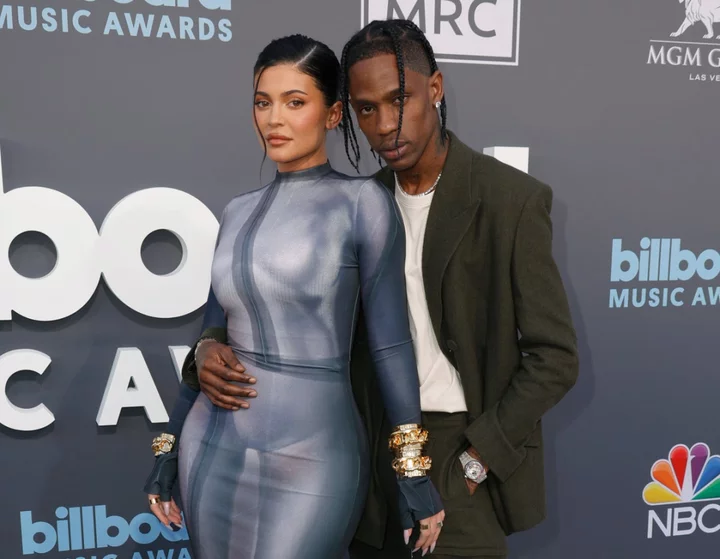
Kylie Jenner says she and ex Travis Scott are doing ‘the best job that they can do’ as co-parents
Kylie Jenner has shared a rare comment about co-parenting with her ex, Travis Scott. The 26-year-old model spoke candidly about her and Scott’s children – Stormi, five, and Aire, one – during an interview with The Wall Street Journal Magazine, published on 24 October. When asked about co-parenting with the rapper, she said: “It’s going…. I think we’re doing the best job that we can do.” Scott and Jenner first started dating in 2017 and had an off-and-on relationship until January 2023. At the time, a source claimed to Us Weekly that the pair were “off again,” after rekindling their romance for a second time in February 2020. However, the publication also claimed that the former couple was still on good terms, adding: “This has happened so many times before, they’re known to be on-again, off-again, but always remain friends and great co-parents.” Since their split, Scott has shown his support for his ex. In April, he took to the comments of one of her Instagram posts and wrote: “A beauty.” However, fans came up with a different theory in July, with claims that a reference in his song, MELTDOWN”, was about Jenner’s new relationship with Timothée Chalamet, who she’s been romantically linked to since May 2023. At the end of the song’s second verse, Scott raps the lines: “Chocolate AP and chocolate the Vs got the/ Willy Wonka factory (Vs)/ Burn a athlete like it’s calories find another flame/ hot as me, b****.” The mention of Willy Wonka is seemingly in reference to Chalamet’s leading role as Roald Dahl’s famous fictional chocolatier in the forthcoming musical feature film, Wonka. During her interview with WSJ Magazine, the reality star also spoke candidly about motherhood, and how her perspective on beauty standards has changed while raising Stormi. She also described some of the lessons she’s teaching her daughter. “My daughter has totally taught me a lot more about myself, and seeing myself in her has changed everything. I’ve had so much growth and am just embracing natural beauty,” she said. “I’m teaching her about mistakes that I made and making sure she knows she’s just perfect exactly how she is.” The Kardashians star specified that some mistakes she’s made over the years have included getting “surgery when [she] was younger”. She added that while she’s never gotten work done on her face, she still decided to have a breast augmentation, which she’s previously been open about. “But just even getting my breasts done when I was 19 and getting pregnant soon after, not obviously planning to be pregnant at 19,” she said. “And I was never insecure about myself. I actually was always super confident and loved my body. I was just having fun. I was influenced by amazing boobs and was like, that’s what I wanted to do, and had fun with it.” According to the Kylie Beauty founder, her experiences can be lessons for her children. “I probably just should have waited until I maybe had kids or let my body just develop,” she said about the procedure, before adding that motherhood is about “teaching our kids to do better than us, be better versions of who we were”. During the interview, she also spoke about legally changing her son’s name from Wolf Jacques to Aire in 2023, one year after he was born. “That was the hardest thing that I’ve ever done in my life,” she said. “I’m still like: ‘Did I make the right decision?’” She also explained how difficult it was for her to come up with her son’s name shortly after giving birth. “The postpartum hit, and the hormones, and I couldn’t even make a decision or think straight,” she added. “And it just destroyed me. I could not name him. And I was like: ‘I feel like a failure. I don’t have a name for my son.’ So it took me a while. And then the longer I waited, the harder it was to name him.” Read More Timothée Chalamet compares Kylie Jenner romance to Harry-Meghan South Park episode Gym maths: How to optimise 22 minutes exercise a day according to fitness experts Chris Pratt sparks relatable parenting debate about childhood trophies Gym maths: How to optimise 22 minutes exercise a day according to fitness experts Chris Pratt sparks relatable parenting debate about childhood trophies Jasmine Harman tearfully recalls mother’s struggles with hoarding
2023-10-26 04:47

Wild Misconceptions About Sharks
In this episode of Misconceptions, host Justin Dodd debunks some myths about these great beasts of the ocean, from whether punching them in the nose is a valid defense tactic to the events that inspired 'Jaws.'
2023-10-26 03:50

'Grandude': America's Most Common Grandparent Nicknames
Calling a grandparent 'Grandmother' or 'Grandfather' is so played out.
2023-10-26 03:28

Deck the Halls With Gore and ‘80s Throwbacks With These Horror-Themed Christmas Ornaments
Middle of Beyond offers holiday ornaments, ugly Christmas sweaters, and more inspired by your favorite '70s and '80s horror classics, including "Evil Dead 2," "Phantasm," and others.
2023-10-26 01:28

Black models to boycott Melbourne Fashion Week in racism row
More than a dozen Black models are boycotting Melbourne Fashion Week in response to what they claim is industry-wide racism. The group of 13 performers are refusing to walk for runway shows or participate in casting calls in order to shine a light on the discrimination they face in Australia, which they say wouldn’t be allowed in Europe or the US. They say the discrimination includes being paid significantly less than their white counterparts, the alleged use of racial slurs, as well as hairdressers talking derogatively about African hair. “Black models doing Australian fashion is a form of self-destruction”, said Sydney-based Awar Malek, 24, told The Sydney Morning Herald. “It is absolutely the most traumatising, and dehumanising, underpaying, and overall mentally draining week and I have no desire to continue to participate.” South Sudanese-born model Nylow Ajing added: “In London, New York and Paris, you could not get away with what the fashion industry is doing here and how it treats black models, but they don’t seem to care or want to change.” The idea for a boycott came after a group of 13 models formed a private group chat to exchange stories and support each other earlier this year. “We never wanted to resort to this but there is only so much we can take,” 30-year-old Jeffrey Kissubi told the newspaper. “Maybe the industry will care about our experiences when it comes from a group rather than one individual that they can quickly silence or just ignore.” They accused brands of “tokenism”, alleging they hire “plenty of Black models” during fashion weeks when they can pay them less. “It’s the only time they hire black models in numbers, and honestly, it’s because we are the cheapest at this time. It’s good PR for them. It looks like ‘wow, these campaigns are really inclusive’, but the next week and the next month, we have no work, and they go back to whitewashing fashion,” Malek added. The casting of models at fashion weeks is decided by exhibiting label, and not festival organisers. A spokesperson for the City of Melbourne said all models participating in the fashion week receive equal pay “with the exception of some higher profile models – including those from diverse backgrounds”. “We were not aware of any concerns relating to diversity or race involving Melbourne Fashion Week. Discrimination of any kind is not tolerated,” a statement to the BBC read. Other grievances raised include a lack of diversity across hair and makeup artists, casting agencies, and photographers. Nyaluak Leth, who relocated to the UK where “Black models are celebrated and valued”, said: “In 2019 behind the scenes at Sydney Fashion Week, one of the black models approached me and asked me to braid her hair and I said ‘but darling, there are so many empty seats in the hair section’, but I could tell that she was really reluctant to even ask for help... because she didn’t trust that anyone knew how to do her hair and she was definitely right.” The models boycotting not just MFW, but the larger industry, have said they’re speaking out despite fears for their career in a bid to bring reform. “I don’t want to speak out, but I have to, or nothing will change,” Kissubi said. The chief executive of the Australian Fashion Council, Leila Naja Hibri told the Sydney Morning Herald: “The Australian fashion industry is uniquely placed to actively engage in equitable, diverse and inclusive responsible practice. The Australian Fashion Council is not involved in the running of fashion weeks or brand marketing events, but we do require all AFC Members to abide by our code of conduct. “This stipulates that we do not tolerate any form of discrimination or inappropriate conduct towards others based on gender, race, or national or ethnic origin. ” The Independent has contacted representatives for the City of Melbourne for comment. Read More Hailey Bieber addresses her and husband Justin Bieber’s wildly different styles Britney Spears tells story behind matching double-denim moment with Justin Timberlake How to do Halloween make up and still take care of your skin Hailey Bieber addresses her and husband Justin Bieber’s wildly different styles Britney Spears tells story behind matching double-denim moment with Justin Timberlake How to do Halloween make up and still take care of your skin
2023-10-26 00:47
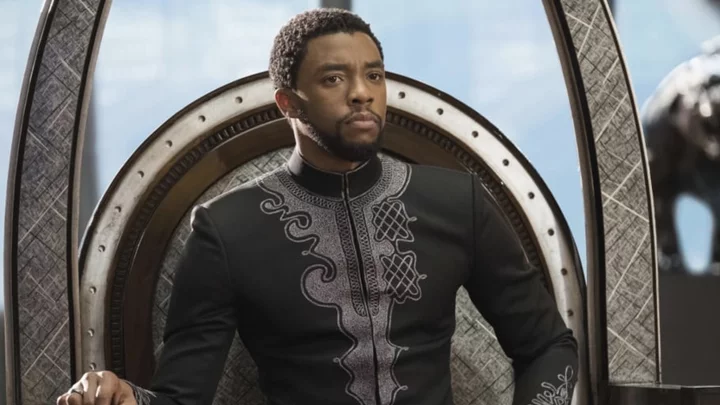
10 Surprising Facts About ‘Black Panther’
‘Black Panther,’ which stars the late Chadwick Boseman, was a major success for the Marvel Cinematic Universe when it hit theaters in 2018.
2023-10-26 00:27

Chris Pratt sparks debate over when parents should throw away childhood trophies
Chris Pratt has asked the question almost every parent wonders when raising their children: Is it okay to throw away childhood trophies? The Guardians of the Galaxy star, 44, recently posed the question to his social media followers after he and his wife, Katherine Schwarzenegger, came across all her childhood trophies kept by her parents, Arnold Schwarzenegger and Maria Shriver. Pratt took to Instagram on 24 October, where he shared several photos of the children’s book author, 33, holding up some of her many childhood trophies - including “Problem Solving Super Star 4th Grade 2000” and “most improved two-year-old in swim class”. In the lengthy caption, the Parks and Recreation alum explained that Schwarzenegger’s mother had been “storing special items” from her daughter’s childhood for years, which he noted was “so very thoughtful”. “To see my darling wife beaming with sentiment as she opens these crates of meticulously organised keepsakes, remembering her cherished youth, makes me grateful for the efforts her folks put into archiving,” Pratt wrote. “I suppose that’s the payoff for the work it took to store this stuff, the smile on her face as she relives moments of her youth. To pray one day that your children will look back on their childhood with glee is a blessing. It is the hope of parenthood.” However, as the couple - who have been married since 2019 - perused Schwarzenegger’s prized possessions, it got him thinking about how long he’s supposed to hold onto his own children’s mementos. Pratt shares an 11-year-old son, Jack, with ex-wife Anna Faris and two daughters - Lyla, three, and Eloise, one - with Schwarzenegger. “Real talk,” Pratt said. “Once your kid goes through the stuff, is it okay to toss? I mean… do we need the ‘I was on a sports team trophy?’ Can they be donated? Repurposed? How many do we gotta keep? Not all of them right? Any of them? Is there a grading scale? Like, did you win? Were you a champion? Is there a specific sentimental connection? Help me out here. Do they go back in storage?” His relatable question prompted many parents in the comments section to sound off on how long they’ve kept their children’s trophies. Some users admitted that they wished their own parents had held onto their accolades for so long. “Wait this is amazing. I’ll be saving my children’s stuff for sure,” one person commented. “Well, I have no keepsakes from childhood and I wish I did. So there is that,” another said. “I had my boys go through their boxes and they kept what was special to them. I tossed the rest,” a third fan wrote. “FREEDOM!!!” Others revealed what they did to cherish their children’s precious memories while still saving some room in the storage bin. “I donated all my old trophies to an organisation that removes the labels and repurposes them for fun awards,” wrote one fan. “For those sentimental ones, we peeled off the engraved part and kept it in a plastic pocket notebook and tossed the trophy part,” said someone else. Another user suggested: “Give them out as prizes when your friends come over for game night.” Meanwhile, Schwarzenegger joked that her husband was simply jealous she’s acquired so many trophies over the years. “Feels like someone is a litttlllee bit jealous of my natural athleticism from birth and ability to solve problems,” she commented. Pratt’s mother-in-law also weighed in on the debate, as she applauded herself for saving almost every prized possession for her four children. “Omg I’m so happy,” Shriver commented. “Here’s to story trophies and school work and dresses and party outfits I feel vindicated.” The Jurassic World star was married to Faris in 2009. The former couple announced their split in August 2017 and finalised their divorce in October 2018, four months after he began dating Schwarzenegger. He proposed to the author in January 2019 and they were married in June that year. Pratt has often shared glimpses into his life as a father of three on social media. Most recently, he went viral when he posted a photo of the glittery makeover he received from his two daughters. He shared two photos of his new look, including one where his forehead was bedazzled with teal, purple, and silver gems. The other photo showed Pratt with pearl-like gems dotting his face, as well as a teal manicure. “All I have to say is… Jack would never do this to me,” he captioned the post. Read More Gym maths: How to optimise 22 minutes exercise a day according to fitness experts Jasmine Harman tearfully recalls mother’s struggles with hoarding Neglecting women’s health at work could cost UK economy £20.2bn a year – analysis Gym maths: How to optimise 22 minutes exercise a day according to fitness experts Jasmine Harman tearfully recalls mother’s struggles with hoarding Neglecting women’s health at work could cost UK economy £20.2bn a year – analysis
2023-10-25 22:57

Jasmine Harman tearfully recalls mother’s struggles with hoarding
TV presenter Jasmine Harman became emotional as she opened up about her mother’s struggles with hoarding – and how it adversely impacted their relationship for years. The host of Channel 4’s A Place in the Sun, Harman, 47, said she “refused to bring people home” and was “really, really embarrassed and ashamed” about her mum Vasoulla’s condition, on Wednesday (25 October) during an appearance on This Morning. “In fact, when I started working in television, it was my biggest fear that someone would find out about the way I’d grown up and the way that we lived at the time,” she told Dermot O’Leary and Allison Hammond. Reflecting on how things had changed since then, Harman teared up as she affirmed her priority is “having a loving relationship” with Vasoulla – and not “focussing on the hoarding” anymore. Addressing her mother, Harman added: “She’s helped me to become a much more compassionate person. We used to fight, didn’t we? “But now we have a relationship that’s outside [of the hoarding].” Hoarding was recognised as a mental health disorder in 2013. According to the World Health Organisation (WHO), it is characterised by “an accumulation of possessions due to excessive acquisition of, or difficulty discarding possessions, regardless of their actual value”. The Diagnostic and Statistical Manual of Mental Disorders (DSM) outlines detailed criteria that psychologists can use to diagnose hoarding, including cluttered living spaces where the room’s intended use [of cooking, sleeping, or sleeping] has become impossible. These behaviours usually appear during a person’s early life, with Vasoulla explaining it was triggered by “the trauma of loss” in her case. “We moved from Cyprus when I was about three so I left my baby things back home and started collecting trinkets in bombed-out houses that were still about in the early Sixties, after the war – trinkets that I treasured,” she explained. “Then we moved back to Cyprus for a couple of years and those things all got lost. Then we moved back to England and all my new ties got lost – so I just had lots of upheaval, lots of loss.” Vasoulla, whose father was killed in Cyprus, added: “It’s more the loss, like a bereavement. Losing your father is a big thing, moving country ...you lose everything and you get a new place to live. The trauma of loss [is] something that a lot of people have as the onset of their hoarding behaviour.” The mother-daughter duo previously opened up about how hoarding affected their lives in a 2011 BBC documentary, titled My Hoarder Mum & Me. Speaking about the “cathartic experience”, Harman on Wednesday confessed:“I genuinely had no idea how many people were affected by this.” Around three million people are reportedly impacted by the mental health condition, according to Hoarding Disorders UK. The organisation’s director Jo Cook, who joined Vasoulla and Harman on the This Morning couch, explained that hoarding is neither a lifestyle choice, nor “about poor housekeeping”. When asked about supporting loved ones who might struggle with hoarding, Cook recommended joining a support group and approaching the anxiety-based disorder with empathy. “It’s really important that that person that you’re helping, feels safe in their home with you. Because, essentially, you’re unpicking someone’s nest, so you need to make sure you’re doing it slowly and surely,” she added. If you have been affected by this article, you can contact the following organisations for support: actiononaddiction.org.uk, mind.org.uk, nhs.uk/livewell/mentalhealth, mentalhealth.org.uk. Read More Pete Davidson is on the market for a hot date - but not for him Gym math: How to optimise 22 minutes exercise a day according to fitness experts Neglecting women’s health at work could cost UK economy £20.2bn a year – analysis Gym math: How to optimise 22 minutes exercise a day according to fitness experts Neglecting women’s health at work could cost UK economy £20.2bn a year – analysis Nearly three-quarters of mothers feel invisible, study suggests
2023-10-25 21:46
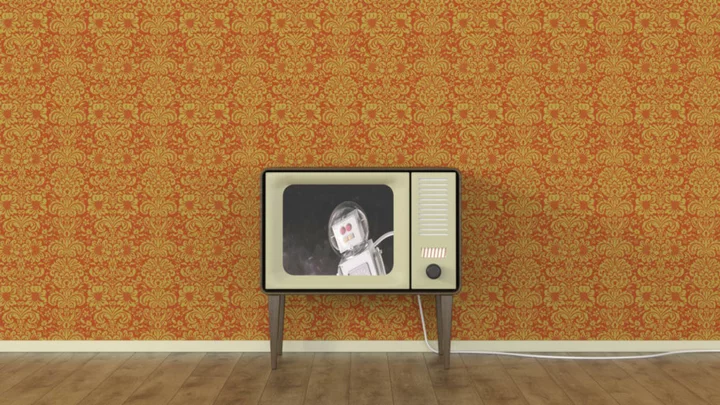
Why Is the First Episode of a TV Show Called a ‘Pilot’?
Getting a concept onto the big screen is a difficult process, and the pilot episode is what can make—or, more often, break—a series. By why is it called that?
2023-10-25 21:28

10 Chilling Facts About Permafrost
About 11 percent of the Earth’s surface is perpetually frozen, though that will surely change as global warming continues.
2023-10-25 20:17
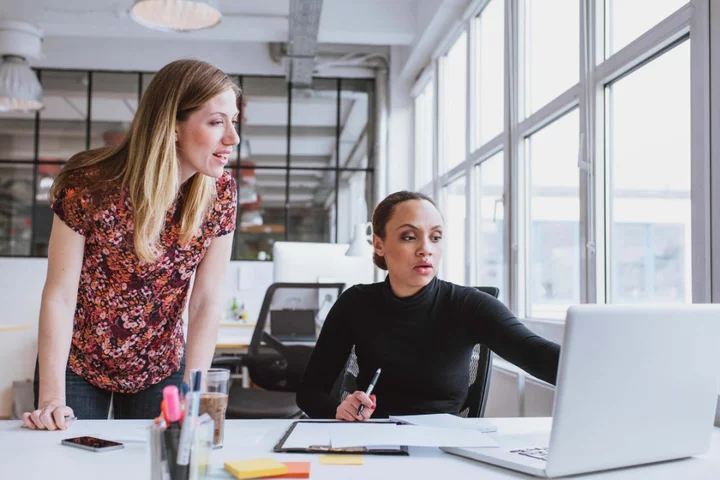
Neglecting women’s health at work could cost UK economy £20.2bn a year – analysis
Neglecting women’s health in the workplace could be costing the UK economy around £20.2 billion each year, analysis has suggested. In a new survey of 2,000 women, 68% said that they have dealt with health issues at some point in their career, whilst almost 29% felt their employers were not supportive. When factoring in specific health matters that relate to women, including endometriosis, fertility, menopause and periods, this figure increases to 36%, leaving 46% of women worried that their health could impact their career trajectory and 48% thinking they would be forced to resign. The study conducted by AXA Health in partnership with the Centre of Economics and Business Research (CEBR) also suggested that 83% of women have had their personal finances affected when faced with health issues. For instance, 52% of women have had to take time off, 22% missed out on a promotion and 20% settled for lower pay. Economic modelling from AXA Health and CEBR suggested that ignoring women’s health at work could be costing the UK economy £20.2 billion a year. From 90% of women struggling emotionally, 46% feeling helpless and 43% feeling less motivated at work, this issue has also had a huge impact on their mental health and wellbeing. “As this report finds, neglecting the health of women in our workplaces isn’t just a matter of compassion; it’s a serious economic oversight,” said Flick Drummond MP, who is serving as the co-chair of the All-Party Parliamentary Group on Women and Work. Dr Pallavi Bradshaw, deputy chief medical officer at AXA Health, added: “While companies certainly still have a way to go in addressing women’s health at work, there is promise in the increased willingness of women to discuss their health concerns with colleagues and managers.. “For example, our women’s health report found that 60% of women who talked about their health found their employers to be supportive, whether this be through time off, offering counselling or making adaptations to the workplace. “These developments are positive, but as we delve further into the findings, it becomes evident that concerns extend beyond just health issues. A striking 53% of the women we surveyed voiced that, within their workplaces, women often shoulder more unplanned responsibilities – such as caring for loved ones – than their male counterparts. “Furthermore, when reflecting on their own families, 39% of respondents revealed that they bear a greater burden than male family members when it came to unexpected caring responsibilities. This gender-based imbalance in unpaid labour not only perpetuates inequality but also places women at risk of being sidelined in their careers, overlooked for promotions, or compelled to work beneath their true potential.” Bradshaw said the economic impact of neglecting women’s health is “still significant”, and urged the need for “more education, robust workplace policies and talent retention initiatives”. The report suggested women who work part-time are hit even harder when it comes to health-related issues. It found that 61% are worried about having to leave their jobs prematurely, which exceeds the average by 19%. Only 17% of women who work full-time believe that conversations surrounding women’s health are not encouraged in their workplaces, but this increases to 23% for those who are employed part-time. According to a report conducted by The Royal College of Obstetricians and Gynaecologists, women represent 51% of the population and 47% of the workforce. Read More Nearly three-quarters of mothers feel invisible, study suggests The best ways to work-out in 22 minutes – as study finds this is magic number for offsetting ‘negative impact of sitting’ What crops will we be growing in the future, as climate change alters the landscape? As Rebecca Adlington shares heart-breaking miscarriage news: How to support others experiencing baby loss What you need to know about new research into treating cervical cancer How to do Halloween make up and still take care of your skin
2023-10-25 19:49
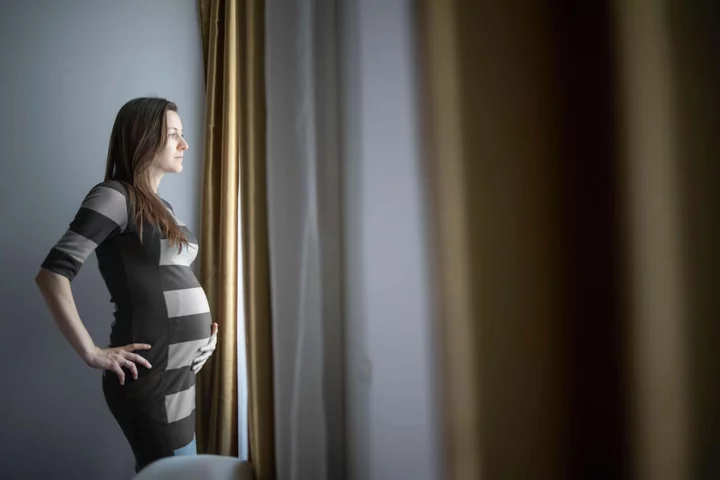
Nearly three-quarters of mothers feel invisible, study suggests
Most women feel ‘invisible’ and ‘unappreciated’ when they become mothers, new research has revealed. Instead of ‘having it all’, 72% of mums feel invisible and 93% feel unappreciated, unacknowledged or unseen once they’ve had children. Another 93% said that since having a child, their identity has been reduced to only being a mother. And the weight of expectation is huge, too, with 97% of mums questioned in the survey by the online motherhood community Peanut saying pressure is put on them to ‘do it all and be it all’. Plus, 94% believe they’re expected to put themselves last and self-sacrifice for their families, partners, jobs, and other responsibilities, so they can achieve what they feel is required of them. Nearly half of mums (46%) said they don’t feel supported by the healthcare system after giving birth, and 70% expected more support from society in general. As a result of this lack of support and invisibility, most women surveyed (95%) agreed there’s an impact on their mental health and wellbeing, with 86% having experienced anxiety, 82% feeling stressed, burned out or exhausted, and 80% feeling overwhelmed, or lonely and isolated. Other strong feelings identified by mums included irritability (78%), loss of identity (65%), feeling judged (66%), feeling unsupported (64%), guilt (63%), depression (55%), resentment (54%), worthlessness (50%), and neglect (24%). Women attributed the things making them feel invisible to unfair division of labour in the home, trying to juggle a career and childcare, lack of empathy and understanding from both family and everyone else, gaps in healthcare and mental health support, identity and independence struggles, hiding the pain of pregnancy loss, and general pressure from healthcare, education institutions and the media. Commenting on the findings, psychologist Dr Rachel Goldman said: “The invisibility of motherhood is a stark reality many face. The journey begins with frequent visits to healthcare providers, but once the child arrives, there’s a sudden gap, creating a sense of abandonment. Women grapple with overwhelming feelings of exhaustion and stress, only to confront rushed appointments where healthcare professionals don’t have time to adequately dive into concerns.” As a result of the research, Peanut has launched an Invisible Mothers campaign, featuring a State of Invisibility report, to draw attention to mums’ struggles and highlight ways to make them more visible and better supported. The report found mums think more empathy and gender equality will help them feel more visible, with 82% calling for flexible, family-friendly workplaces, 77% wanting equal and extended leave for both parents, and 71% saying an equal share of parenting tasks would help. Additional measures that will help mums, says Peanut, include more public toilets having changing facilities, additional resources for mental health support, support groups for both parents, and educational initiatives about gender stereotypes. The report also identified the most common unwanted questions that contribute to mothers’ feelings of invisibility, with alternative suggestions that women say they would prefer to hear. So instead of asking ‘How’s the baby?’, Peanut suggests mums are asked ‘How are you really – mentally, emotionally and physically?’, and rather than ‘Was the pregnancy planned?’, try ‘Are you excited?’, and change ‘How do you do it all?’ to ‘How’s the mental load?’. Goldman added: “It doesn’t take grand gestures to offer support. A genuine ‘how are you’ or ‘thinking of you’ can significantly shift perceptions, signalling to someone that they matter. Small changes or actions, like compassionate conversations, can have profound impacts. “By acknowledging and addressing these issues, we can begin to truly support motherhood.” Read More The best ways to work-out in 22 minutes – as study finds this is magic number for offsetting ‘negative impact of sitting’ What crops will we be growing in the future, as climate change alters the landscape? As Rebecca Adlington shares heart-breaking miscarriage news: How to support others experiencing baby loss What you need to know about new research into treating cervical cancer How to do Halloween make up and still take care of your skin Which houseplants best suit your star sign?
2023-10-25 19:28
